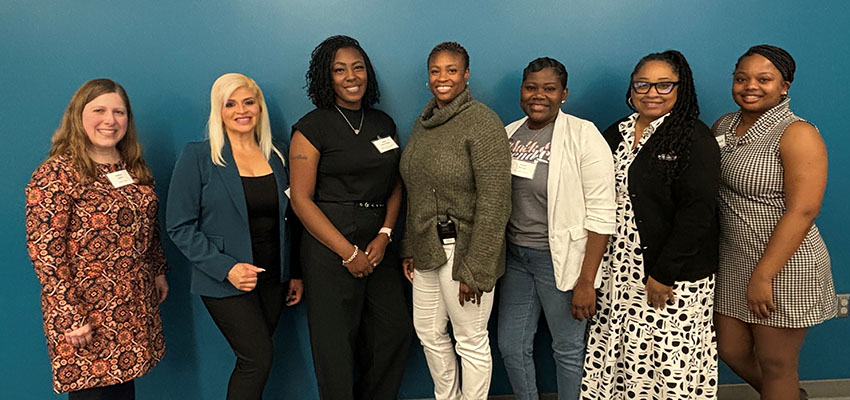 Presenting at the April 2 PD for All, from left: Stephanie Huckins, Ana Yumul, Alesia Braimah, Dalhia Lloyd (moderator), Bianca Sherman, Nicole Looper, and Paige Muhammad.
Presenting at the April 2 PD for All, from left: Stephanie Huckins, Ana Yumul, Alesia Braimah, Dalhia Lloyd (moderator), Bianca Sherman, Nicole Looper, and Paige Muhammad.By Erin Duffy
Alesia Braimah has a bright and cheerful 5-year-old son who wants everyone to know he plays basketball.
And yet, his early years in education were a struggle at times. He was suspended from two preschools. He has a stutter and couldn’t always communicate clearly in the classroom—staff finished his sentences for him. Braimah got used to dropping him off at child care in the morning and getting called to pick him back up 30 minutes later after an outburst.
“I just wanted the teacher to see how smart (he) really was,” she said. “I needed someone to see who (he) was. But all they saw was his behavior.”
Braimah brought a powerful parent perspective to the Buffett Early Childhood Institute’s Professional Development for All (PD for All) event on April 2. Working Together to Support Young Children: An Evening with Community Members featured a panel discussion moderated by Dalhia Lloyd, the Institute’s director of professional learning. In addition to Braimah the speakers included:
- Stephanie Huckins, a therapist at Arbor Family Counseling
- Nicole Looper, the executive director of the Nelson Mandela Early Childhood Development Center
- Paige Muhammad, a third-grade teacher at Wakonda Elementary
- Bianca Sherman, an assistant principal at Nelson Mandela Elementary
- Ana Yumul, the owner and director of Bella’s Daycare
The theme of this year’s PD for All series is “Nurturing Positive Adult-Child Interactions When Behaviors Challenge Us.”
Register now for the next free event on this topic, which will feature early childhood educator and trainer Carolina Cajica. That event, on May 7, will be conducted entirely in Spanish, with English interpretation available.
Read the recap of our first PD for All event led by 2020 National Teacher of the Year Tabatha Rosproy.
The panel was attended by roughly 50 early educators and community members, who listened as panelists described how they build positive relationships with children and families while addressing behavioral issues.
“We know behavior is a form of communication,” Sherman said. “Knowing that, it’s really my job to get the student back on track. But how am I going to do that? By staying calm, being reflective in my approach.”
Sherman’s school does not suspend students and uses restorative discipline practices that encourage children to build and repair relationships in their school community.
Yumul said young children often don’t know how to articulate how they feel. She tries to teach them the words to describe their emotions and has them check in with her each morning—are they sad? Tired? Hungry?
“It helps them communicate in the classroom and with their parents,” she said.
Her classroom has a cozy corner where kids can sit and take a breath. Muhammad has a similar cool-down corner in her classroom, where kids can rake sand or play with a fidget toy to self-regulate and calm down.
Looper said she tries to examine the underlying issues that may be affecting a child’s behavior.
“You have to have a conversation with children,” she said. “I had students who threw chairs. Bit. Hit. And I wondered, what’s going on? And some of them do not know why they’re doing it. They’re frustrated, angry, upset. They don’t know how to explain it. We have to understand when we have scholars that need us the most.”
Huckins reminded teachers to practice mindfulness and self-care when they get stressed on the job. She shared two children’s books (“The Rabbit Listened” and “Noticing”) that can help kids observe, understand, and explain their emotions.
“In thinking about how we’re feeling and reacting to our students, it’s important to reflect on our own experiences in life and what our triggers are,” she said. “What are the things that bother me or set me off? What are the thoughts or feelings you’re having and how do you challenge those? It’s not personal, but sometimes it feels really personal.”
Parents may feel defensive—it can be hard to hear that your child is struggling at school. But panelists said families and teachers should ideally work as partners to solve a child’s issue or find additional resources to help them.
Positive feedback can help build that trust. Don’t just call home when a student is acting up—let parents know when they succeed, too.
One of Muhammad’s students had a tough day and was sent to the office. The following day, “I wrote him a note and said ‘I’m so glad you showed up today. Let's have a good day,’” she said. “I forgave him. We forgave each other. And he had a great day.”
Erin Duffy is the managing editor at the Buffett Early Childhood Institute at the University of Nebraska and writes about early childhood issues that affect children, families, educators, and communities. Previously, she spent more than a decade covering education stories and more for daily newspapers.
Have a comment, a question, or a story idea? Reach Erin at erinduffy@nebraska.edu